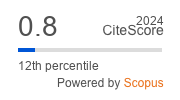Simulation of the radio absorbing properties of pyrolyzed polyacrylonitrile in the frequency range from 3 to 50 GHz
https://doi.org/10.17073/1609-3577j.met202305.566
EDN: DIFBEY
Abstract
Currently, the electromagnetic characteristics of various materials, including polymers, are being widely studied with the aim of using them as radio-absorbing coatings in electronics products. One such material is pyrolyzed polyacrylonitrile (PPAN). A model of electromagnetic wave absorption by PPAN layers with electrical conductivity of 72 and 180 S/m and a layer width of 0.15 to 2 mm, including those containing a metal filler (the so-called PPAN-based metal composite), in the frequency range of 3–50 GHz is considered. The simulation was performed in the COMSOL Multiphysics software package.
A comparison of the experimental results with the data obtained during the simulation was carried out for such parameters as reflection, transmission and absorption. The conclusions obtained from the analysis of simulation data coincide with the results of practical experiments. Analysis of the model showed the convergence of modeling results with experimental data at a qualitative level.
Keywords
About the Authors
D. P. RadchenkoRussian Federation
100 Universitetsky Ave., Volgograd 400062
Daniel P. Radchenko — Senior Lecturer at the Department of Information Security
I. V. Zaporotskova
Russian Federation
100 Universitetsky Ave., Volgograd 400062
Irina V. Zaporotskova — Dr. Sci. (Phys.-Math.), Professor, Director of the Institute of Priority Technologies; ,
L. V. Kozhitov
Russian Federation
4-1 Leninsky Ave., Moscow 119049
Lev V. Kozhitov — Dr. Sci. (Eng.), Professor
P. A. Zaporotskov
Russian Federation
100 Universitetsky Ave., Volgograd 400062
Pavel A. Zaporotskov — Cand. Sci. (Phys.-Math.), Associate Professor of the Department of Forensic Science and Physical Materials Science
A. V. Popkova
Russian Federation
24 Zheleznodorozhnaya Str., Podolsk 142103
Alena V. Popkova — Cand. Sci. (Eng.), Senior Researcher
V. G. Kosushkin
Russian Federation
2 Bazhenov Str., Kaluga 248035
Victor G. Kosushkin — Dr. Sci. (Eng.), Professor, Head Department of Materials Science
References
1. Berlin A.A. (ed.). Kerber M.L., Vinogradov V.M., Golovkin G.S., Gorbatkina Yu.A., Kryzhanovskii V.K., Kuperman A.M., Simonov-Emel'yanov I.D., Khaliulin V.I., Bunakov V.A. Polymer composite materials: structure, properties, technology. Polymer composite materials. St. Petersburg: Professiya; 2008. 560 p. (In Russ.)
2. Patent (RU) No 1721634 SU11, MPC H01B 1/04, H01B 1/18, H01B 1/20, H01B 1/22. Zaliznaya N.F., Zemtsov L.M., Karpacheva G.P., Davydov B.E., Kozlov Yu.G., Khrekin A.V., Shchekin I.A. Method of obtaining conductive coatings. Appl.: 01.11.1989; publ.: 23.03.1992. (In Russ.). URL: https://yandex.ru/patents/doc/SU1721634A1_19920323
3. Berlin A.A., Geiderikh M.A., Davydov B.E., Kargin V.A., Karpacheva G.P., Krentsel' B.A., Khutareva G.V. Chemistry of polysynthetic systems. Moscow: Khimiya; 1972. 272 p. (In Russ.)
4. Davydov B.E. Some chemical features and semiconductor properties of polyconjugated systems thesis. Diss. Dr. Sci. (Chem.). Moscow; 1965. 487 p. (In Russ.)
5. Ghorpade R.V., Cho D.W., Hong S.C. Effect of controlled tacticity of polyacrylonitrile (co)polymers on their thermal oxidative stabilization behaviors and the properties of resulting carbon films. Carbon. 2017; 121: 502–511. https://doi.org/10.1016/j.carbon.2017.06.015
6. Obraztsov A.N., Volkov A.P., Petrushenko Y.V., Satanovskaya O.P. Application of nanocarbon cold cathodes in lighting elements. Surface and Interface Analysis. 2004; 36(5-6): 470–473. https://doi.org/10.1002/sia.1711
7. Han Q., Wang F., Wang Z., Yi Z., Na Z., Wang X., Wang L. PAN-based carbon fiber@SnO2 for highly reversible structural lithium-ion battery anode. Ionics. 2018; 24(4): 1049–1055. https://doi.org/10.1007/s11581-017-2261-0
8. Han Q., Shi M., Han Z., Zhang W., Li Y., Zhang X., Sheng Y. Synthesis of one-dimensional PAN-based carbon fiber/NiO composite as an anode material for structural lithium-ion batteries. Ionics. 2020; 26(12): 5935–5940. https://doi.org/10.1007/s11581-020-03762-8
9. Kozhitov L.V., Emel'yanov S.G., Kosushkin V.G., Strel'chenko S.S., Parkhomenko Yu.N., Kozlov V.V., Kozhitov S.L. Technology of materials for micro- and nanoelectronics. Kursk: Southwestern State University; 2012. 862 p. (In Russ.)
10. Radchenko D.P., Zaporotskova I.V., Kozhitov L.V. Radio absorption properties of pyrolyzed polyacrylonitrile: a model in the range from 1 to 3 GHz. Proceed. of the Inter. scient. conf. “Actual Problems of applied mathematics, informatics and mechanics”: Voronezh, December 13–15, 2021. Voronezh. OOO "Velborn"; 2022. 701–706 p. (In Russ.)
11. Zaporotskova I.V., Kozhitov L.V., Anikeev N.A., Davletova O.A., Muratov D.G., Popkova A.V., Yakushko E.V. Synthesis, properties and modelling of metallocarbon nanocomposites. Volgograd; Iz-vo VolGU; 2019. 534 p. (In Russ.)
12. Radchenko D.P., Kozhitov L.V., Boroznina N.P., Kakorina O.A., Boroznin S.V., Belonenko, Zaporotskova I.V. New radar-absorbing metal composites based on pyrolyzed polyacrylonitrile containing atoms of transition metals Ni and Co. Bulletin of the Russian Academy of Sciences: Physics. 2021; 85(12): 1348–1353. https://doi.org/10.3103/S1062873821120376
Review
For citations:
Radchenko D.P., Zaporotskova I.V., Kozhitov L.V., Zaporotskov P.A., Popkova A.V., Kosushkin V.G. Simulation of the radio absorbing properties of pyrolyzed polyacrylonitrile in the frequency range from 3 to 50 GHz. Izvestiya Vysshikh Uchebnykh Zavedenii. Materialy Elektronnoi Tekhniki = Materials of Electronics Engineering. 2023;26(4):300-308. (In Russ.) https://doi.org/10.17073/1609-3577j.met202305.566. EDN: DIFBEY






































